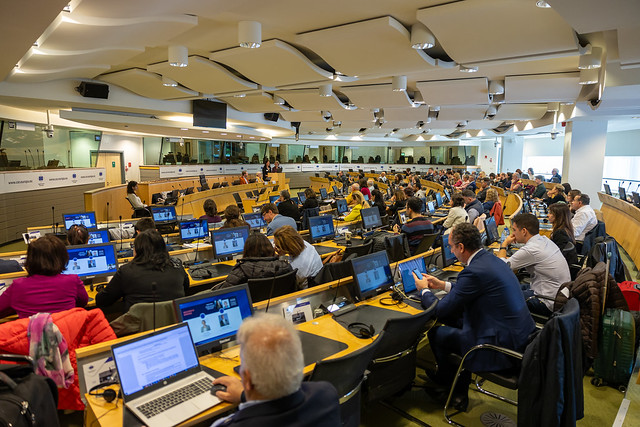
The second day of the EU Week for Sustainable and Inclusive Communities, focusing on the theme "The Future is SHAFE," kicked off with an opening session led by Carina Dantas and Willeke van Staalduinen, the chair and vice-chair of the COST Action NET4Age-Friendly. Following their welcome remarks, the official opening session at the Committee of the Regions was conducted by Isabel Marto, Vice-President of Pombal Municipality, and Ronald de Bruin, Director of the COST Association, the event hosts. Their remarks emphasized the need to foster inclusive, accessible, and sustainable environments for all ages across Europe. This foundational message set the tone for a day filled with discussions on policy, innovation, health, and community networks.
This was also the day of the handover of SIRENE and NET4Age-Friendly, with a symbolic event where the main achievement of these projects were delivered to regional representatives, namely from Portugal, Spain, Italy, Germany and Ireland, as well as to relevant European networks such as ENSA, one of the co-organisers, the RSCN, EUREGHA and ELISAN.
The first panel, titled "Connecting Policies Towards More Inclusive European Regions," moderated by Giuseppe Lugano, Science Officer at COST Association, brought together leading voices in the field. Besides Carina Dantas, the President of the European Innovation Council Michiel Scheffer, the European Commission Policy Officer Alina Lupu, and the EC Joint Research Centre officer Maguelone Vignes. The panel focused on how different policies can be aligned to create a more inclusive Europe. The speakers highlighted the importance of collaboration between regions to harmonize ageing-friendly initiatives and discussed the economic benefits of investing in inclusive regions. The group concluded with the importance of grassroots movements and local governance in shaping policies that meet the real needs of European citizens, particularly those in more vulnerable situations.
Following this, the session "Innovation Frameworks and Tools – The Garcia Family: How to Use the SIF in Practice," led by Miriam Cabrita from SHINE 2Europe and Willeke van Staalduinen, explored practical approaches to implementing innovation frameworks. The session showcased how the Social Innovation Framework (SIF) can be used to address social challenges, with a particular focus on ageing populations. The Garcia family's journey was illustrated as a case study demonstrating the tangible benefits of SIF in creating supportive and inclusive environments. Willeke further elaborated on how this tool can empower communities and stakeholders to develop solutions that enhance the quality of life for all.
The panel titled "Social Inclusion and Healthy Lives in the EU" delved into key issues surrounding the promotion of well-being and inclusivity across European communities, emphasizing the intersection of social inclusion and health. Moderated by Joost van Hoof, Professor of Urban Ageing at The Hague University of Applied Sciences, the session gathered Martina Rimmele, Edward Scipio, Marius Geanta, and Mireia Ferri who shared their diverse insights and expertise.
Next came the panel "Looking at the Future: Health and Wellbeing of European Citizens," moderated by Adem Kumcu, President of UNITEE. Speakers Elena Curtopassi, Michele Calabro, Maddalena Illario, and Lars Münter discussed the future of health and wellbeing in Europe, particularly in the context of an ageing population. They emphasized the role of technology and digital health solutions in improving access to care and highlighted the need for holistic approaches that integrate mental and physical health. This panel brought attention to the importance of community-based care models that ensure health equity and sustainability, fostering environments where citizens can thrive in later stages of life.
The panel "Science to Implementation – The NET4Age-Friendly Experience" was moderated by Pedro Roseiro, Executive Board Member at TICE.PT, and featured Aurelija Blaževičienė, Luiza Spiru, and Milica Solarevic as speakers. This session focused on how research and scientific findings are being translated into practical actions to create age-friendly environments. The speakers highlighted key findings from recent studies on ageing and shared successful examples of NET4Age-Friendly initiatives that have been implemented across Europe. Their experiences underscored the importance of evidence-based approaches to creating inclusive communities that meet the diverse needs of an ageing population.
The final panel of the day, "Inclusive Communities Boosted by Networks and Science," moderated by Karolina Mackiewicz, Innovation Director at ECHAlliance, explored the power of networks in driving inclusive growth. Kenneth Bone, Mara Diaconu, and Toñi Caro discussed how scientific research and collaboration can foster stronger, more resilient communities. The speakers emphasized the role of digital platforms in facilitating knowledge exchange and illustrated the potential of community-based projects to foster inclusivity, especially in rural and underserved areas.
The day ended with a reflective session, "Conclusions and Informal Closing of NET4Age and SIRENE," where the speakers summarised the key takeaways from the conference. Carina and Willeke encouraged participants to continue fostering collaborations across Europe after this event. They highlighted the crucial role that NET4Age-Friendly and SIRENE play in shaping policies and innovations that will contribute to a more inclusive, sustainable, and age-friendly Europe.
This second day of discussions not only strengthened the commitment to building inclusive communities but also demonstrated the practical steps and policies necessary to bring this vision to life.